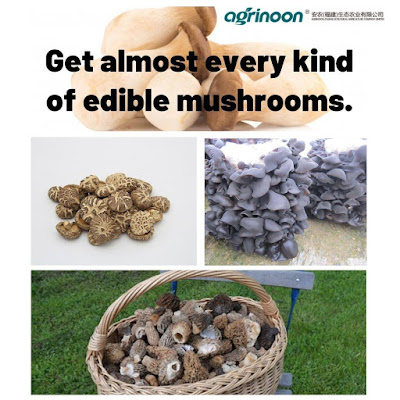If you go through the history of fungi
culture, they go thousands and thousands of years back. It all began in Asia,
and only in recent times has it been adopted commercially in the west. If you
have a woodlot in your possession, you may want to get involved in the
cultivation of toadstools. This will give you a chance to diversify the
products, and you will also get an opportunity to increase your revenue.
Certain factors
You will be able to grow countless varieties
such as lion’s mane, oyster, shiitake, and chestnut. Get started with Mushroom logs for sale acquired
through the website of www.agrinoon.com.
·
Types of hardwood
For
the growth of toadstools, most of the hardwood species are appropriate. It
would be best if you chose barks of hardwood trees based on the availability in
your neighborhood. Shiitake types grow best on red maple, sugar maple, and oak.
On the other hand, white birch is best for the oyster variety. Other types of
hardwood which are suitable are balsam, alder, beech, poplar, and willow.
Obtain productive yield with the help of kits purchased from Mushroom Log suppliers.
·
Appropriate size
For
inoculation, the diameter should be in the ideal range of four inches to eight
inches. The trees for this purpose should be cut in their dormant state. That
implies that they should bear buds. Not even small ones. The moment the buds
make their appearance, both sugar and water become mobilized, so the conditions
are not suitable for fungi culture. Buy Mushroom Logs in
bulk to obtain bountiful growth.
·
Proper care
The
tackling of the barks should be done carefully. Care should be taken so as not
to cause any damage to the bark. The objectives are maintenance of moisture and
protection against colonization of their competitive fungus. Commence the
cultivation process with mushroom spawn bags.
·
Keeping them in a cool place
After
cutting, the stumps should be allowed to sit in a damp setup for at least two
weeks before inoculation. You can keep them for a maximum of four weeks in this
state. Either it would be best if you kept them covered with a tarp or use the
hose at periodic intervals for spraying.
·
All about substrate
After
the curing process, it is now time for inoculation. Mycelium is the thread-like
hyphae that are used on the substrate. This is referred to as spawn. You can
avail of a wide range of substrates from stores. The most commonly used ones
are those made of sawdust and plug. These are pocket-friendly options, and your
choice will be dependent upon the number of barks you would want to
inoculate.
·
Full colonization
Ideal
conditions need to exist for colonization. After full colonization, fruiting
takes place. It may occur in the same year of inoculation or the year after
next. Fruiting requires the blending of moisture and the right
temperature.
Taking a prudent approach
It is a smart decision to make an intensive
study on the net to obtain the names of leading companies involved in the
production of spawn. The company from whom you intend to buy the supplies
should be a trustworthy name in the market.













0 comments:
Post a Comment